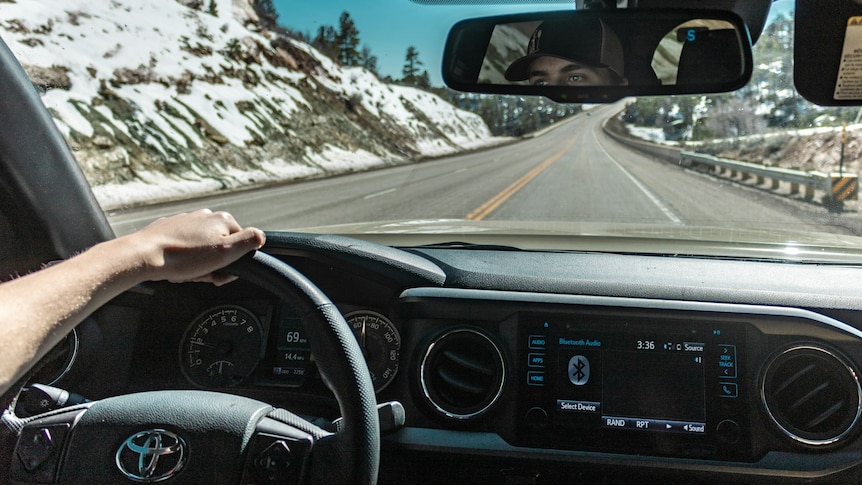Rafi Alam from CHOICE told The World Today: “When we looked at Toyota’s privacy policy, we found that these Connected Services features will collect data such as fuel levels, odometer readings, vehicle location and driving data, as well as personal information like phone numbers and email addresses.”
The program’s policy document says Toyota collects data for various purposes if drivers don’t opt out — including for safety, security, research, product development and data analysis — but the company may also share it with third parties such as finance and insurance companies, debt collection agencies and market research organisations.
In 2023, the Mozilla Foundation reviewed the privacy standards of 25 major car brands, including Toyota. All 25 received failing marks for consumer privacy.
The report found brands such as BMW, Ford, Toyota, Tesla, Kia, and Subaru could “collect deeply personal data such as sexual activity, immigration status, race, facial expressions, weight, health and genetic information, and where you drive”, which they could potentially sell to third parties.
Nissan was accused of being “the very worst offender”, while Toyota was found to have “a near-incomprehensible galaxy of 12 privacy policy documents”.
Can you trust them with everything about what you do in the car, what you say in the car, who’s in the car, where it goes, your connections to every other online data service?
There needs to be a guide that lists which year models (how far back do you need to go) don’t have privacy violating tracking built in.
This is the best summary I could come up with:
Dr Katharine Kemp, from the Faculty of Law & Justice at the University of New South Wales, says cars can collect information through features like their cameras, sensors and internet-connected systems, but also from drivers’ mobile devices and their dealings with related third parties.
The program’s policy document says Toyota collects data for various purposes if drivers don’t opt out — including for safety, security, research, product development and data analysis — but the company may also share it with third parties such as finance and insurance companies, debt collection agencies and market research organisations.
“The more I looked into it, the way that Toyota can log into your car remotely, keep a record of all sorts of bits and pieces, and possibly share your driving behaviour with your insurance company — I just thought the whole lot outweighed the benefits,” he said.
In a statement to ABC News, the company said customers could opt out of Connected Services, but that doing so would disable other features including Bluetooth and speaker functionality.
The report found brands such as BMW, Ford, Toyota, Tesla, Kia, and Subaru could “collect deeply personal data such as sexual activity, immigration status, race, facial expressions, weight, health and genetic information, and where you drive”, which they could potentially sell to third parties.
CHOICE’s Mr Alam told the ABC’s RN Drive that consumers should be able to have modern connectivity features without car companies sharing their information with third parties.
The original article contains 1,032 words, the summary contains 240 words. Saved 77%. I’m a bot and I’m open source!
Removed by mod
I love cars but it’s a discouraging time. There are fewer cars and more trucks and SUVs, the trucks and SUVs are too big, vehicles have too much tech that’s too intrusive, and most of all they are super expensive.
The alleged post-pandemic chip scarcity made me believe that cars would have less bloat. Electric cars made me believe that the future trend of cars would be smaller and lighter cars, to increase their range. It looks like we are headed to road smashing trucks that are deadlier to anything but their own driver
Is there a way for Americans to buy EU cars?
As it would be better here. The example is even an asian manufacturer. As it looks like now, my next car will be from a few years ago.
Didn’t read the article, but is there a guide to opt-out and turn off the data collection?
No. The small print and you giving them the right to do so is you purchasing the car. There are different ways to track you and just like Amazon or Apple tracking you, their so-called options to opt-out are questionable or limited at best.
Toyota owners manual has the instructions
There is a software opt-out in the settings, but how effective that is may be questionable.
To be certain, you can disconnect the antenna that is used for cellular connectivity. How to do that will differ model to model and you would need to reference a factory service manual.
To be very certain, you need to disconnect power to the module with the cellular interface, which may mean switching to an aftermarket head unit(stereo) if the cellular unit is integrated with the infotainment. That can be as simple as removing a fuse or it may mean getting access to the module and removing and isolating the power wire from the connector of the module is separate from the infotainment.
literally every brand does this, but toyota seems to be one of the worst offenders.
good thing i drive a 2002 which still has a casette player.
Thats a reason for me, not to buy ecars, because there is gonna go many yeard before there willbee laws to stop that collection of data. Shoshana Zuboff was right when she wrote her book!
deleted by creator
https://vehicleprivacyreport.com/
You can check your car with the link above.
Great write up on the topic of data collection in motor vehicles: https://therecord.media/car-data-privacy-service-wiping
US-only








